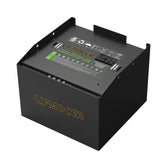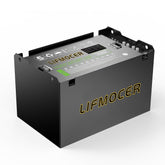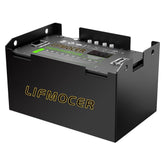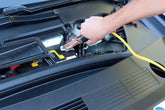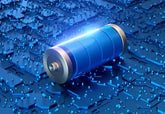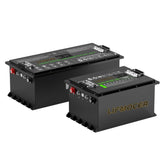How to Jump Start a Car without Jumper Cables?
When Your Car Battery Dies and You Have No Jumper Cables
It happens more often than you think — you turn the key, and nothing happens. Maybe you left your headlights on overnight, maybe the battery is getting old, or perhaps freezing weather drained it faster than usual. In some cases, your car's electrical system might even have a slow leak that discharges the battery while parked. Whatever the reason, you suddenly find yourself with a dead battery and no jumper cables around.
So, what do you do when you're stuck with no cables and no second vehicle to help? This guide will walk you through how to jumpstart a car without cables — exploring a few practical methods, safety precautions, and the limitations you should know. My intention in writing this guide is not to encourage you to take risks, but to help you understand safe and feasible emergency response plans and be prepared for the next time your battery suddenly dies at the worst possible moment.
Understanding the Basics: How a Car Starts
Before diving into the methods, it helps to understand what's really happening when you turn the ignition key. Your car battery provides the initial surge of electricity that powers the starter motor, which in turn cranks the engine. It also supplies power to the fuel injectors and the electronic control unit (ECU) — essential systems that bring the engine to life. Once the engine is running, the alternator takes over, generating electricity to recharge the battery and keep everything operating smoothly.

When the battery runs out of charge, these systems lose their power source, and the car simply won't start. That's why traditional jumper cables work — they temporarily borrow power from another vehicle's battery. But even without jumper cables, there are alternative ways to get your car started. Some of them, like using a portable jump starter or push-starting a manual transmission vehicle, can work effectively in the right conditions. However, newer cars with automatic transmissions and advanced electronics may not respond well to these techniques — making it essential to understand which solutions are safe and applicable to your situation.
Method 1: Use a Portable Jump Starter
What is a Portable Jump Starter?
A car jump starter, such as the LIFMOCER GS300 or GS400 lithium jump starter, is a self-contained power device designed to start your car without the need for another vehicle. It works as an independent energy source, delivering high current directly to your battery. If you're wondering how to jumpstart a dead battery without another car, this is the safest and most reliable solution. These modern lithium-powered jump packs are compact, rechargeable, and perfect for emergency use when your car battery dies unexpectedly.
How to Use Jump Starter Safely
How to jump start car with a portable jump starter is quick and simple, but following the correct sequence is important to avoid sparks or short circuits:
- Make sure the battery jump starter is fully charged before use.
- Connect the red clamp to the positive terminal (+) of your car battery.
- Attach the black clamp to the negative terminal (–).
- Turn on the jump starter and start your vehicle.
- Once the engine is running, remove the clamps — black first, then red.
Advantages
- Can be used independently — no need for another car or jumper cables.
- Fast, safe, and reusable with built-in protection systems.
- Perfect for emergencies, long road trips, or remote areas.
Among all alternatives for how to jump start a car without another car, a lithium jump starter is the most convenient and dependable choice. Keep one in your trunk as a piece of essential car emergency power equipment, and you'll never have to worry about being stranded with a dead battery again.

Method 2: Push or Bump Start (Manual Transmission Only)
How It Works
This method is suitable for manual transmission vehicles and relies on the car's momentum to turn the engine over. By using the wheels to spin the engine, you can start the car without jumper cables or a second vehicle. If you've ever wondered how to start a manual car without another car, this is the classic “push start” technique.
Steps
- Find a safe, flat area or a slight downhill slope.
- Turn the ignition key to the “on” position.
- Press the clutch and shift into second gear, then have a friend push the car.
- When the car reaches about 5 mph (8 kph), quickly release the clutch and gently press the accelerator.
Important Warnings
- This method does not work for automatic transmission vehicles.
- Do not attempt in busy traffic or on slippery surfaces.
- If the battery is completely dead or the ECU has lost power, push-starting may not succeed.
Push starting a manual car is a handy skill for emergencies, but it requires coordination, a safe environment, and a vehicle capable of being manually started. Always prioritize safety and avoid attempting this method on automatic cars or in unsafe conditions.

Method 3: Replace or Swap the Battery Temporarily
What It Is
This method involves using another charged car battery to replace your dead battery temporarily. It's an effective way to start your car without cables when jump starters or other methods are not available. Essentially, you're giving your vehicle a fresh energy source for ignition.
How to Do It
- Turn off your vehicle's ignition and remove the key.
- Carefully disconnect the negative (–) and positive (+) terminals from the dead battery.
- Connect a fully charged spare battery to the terminals.
- Start the car as usual and let the engine run for several minutes.
- After successful ignition, reconnect your original battery if it can still hold charge or replace it with a new one.
Safety Tips
- Always double-check the polarity before connecting the battery to avoid short circuits.
- Do not let the positive and negative clamps touch each other during installation.
- Wear insulated gloves and avoid working near open flames or flammable liquids.
This temporary battery swap is a practical dead battery solution when no jumper cables or jump starters are available. However, it's important to handle the process carefully—incorrect connections can damage the car's electrical system. Whenever possible, use a dedicated car battery jump starter to minimize risks and ensure stable performance.

Method 4: Call for Roadside Assistance or a Mechanic
When to Choose Roadside Assistance?
Sometimes, the safest and most reliable way to jumpstart a car without cables is to let professionals handle it. If your battery is completely dead, or you suspect deeper issues such as a faulty alternator or wiring problem, calling roadside assistance is the smartest move. Modern service trucks often carry advanced lithium jump starters and diagnostic tools that can identify the root cause quickly.
What to Expect
- Provide your exact location and describe the issue clearly (for example: “car won't start, no jumper cables available”).
- The technician will bring either a jump pack or a replacement battery to start your car safely.
- If the battery or alternator is damaged, they can help tow the vehicle to a nearby service center.
Why It's a Smart Move
Professional roadside services minimize the risk of damaging your vehicle's electronics or triggering airbag systems during improper jump attempts. This approach ensures safe car recovery and avoids unnecessary stress, especially in unfamiliar or unsafe areas.
While waiting, avoid trying random tricks found online — modern vehicles use sensitive ECUs that can be harmed by incorrect voltage or polarity. If you frequently experience dead battery issues, consider keeping a reliable lithium jump starter in your trunk for emergencies.

Common Myths & Risks
Not Every Car Can Be Jumped Without Cables
One of the biggest misconceptions about how to jump start a car without jumper cables is assuming every vehicle can be started this way. In reality, modern automatic transmission cars cannot be push-started because their drivetrains and torque converters don't mechanically link the engine to the wheels like manual cars do. Even older manual cars may fail to start if the battery is completely dead or the electronic control unit (ECU) has no residual power.
Another overlooked fact is that the alternator is not a self-exciting system—it needs a minimal charge from the battery to begin generating power. If your battery is totally drained, the alternator cannot “recharge itself,” meaning the car will stall again shortly after starting.
Electrical Damage Risks
Attempting unconventional methods to jumpstart a car without cables can introduce serious electrical hazards. When there's no functioning battery to stabilize voltage, sudden current surges may harm sensitive components such as the ECU, sensors, or infotainment systems. Incorrect polarity—reversing positive and negative terminals—can cause short circuits or dangerous sparks.
There are verified Reddit discussions where users reported alternator surge incidents that fried internal circuits after trying DIY power sources. Such real-world examples highlight why safety and proper equipment matter more than improvisation.
Other Misconceptions
- Using random metal wires or coat hangers as makeshift jumper cables is extremely dangerous and can lead to severe electric shock or fire.
- Connecting multiple power tool batteries (like drill batteries) in series to start a car may seem clever but usually provides insufficient current and risks burning the wiring harness.
In short, there's no truly “universal trick” to revive a dead battery safely without the right tools. Always treat your car's electrical system with caution and rely on tested solutions like a portable lithium jump starter or professional roadside help.
Preventive Measures
Be Prepared Before It Happens
The best way to handle a dead battery situation is to prevent it from happening in the first place. Keeping a portable lithium jump starter, such as the LIFMOCER GS300 or GS400, in your vehicle ensures you can jumpstart a car without cables anytime, anywhere. These compact devices act as your personal battery jump starter — perfect for unexpected breakdowns or long road trips.
Regularly check your battery's health, including voltage levels, age, and cold cranking amps (CCA). A weak or aging battery often shows early warning signs like dim headlights or slow cranking. Avoid leaving your car unused for long periods, forgetting to turn off interior lights, or frequently powering accessories when the engine is off — all of which can drain the battery over time.
Maintenance Habits
- Start your vehicle at least once a week to keep the battery active and maintain charge levels.
- In winter, protect the battery from freezing temperatures — consider indoor parking or using insulation covers.
- Clean the battery terminals periodically to prevent corrosion, which can affect conductivity and starting efficiency.
By following these simple habits, you can extend your battery's lifespan and reduce the risk of being stranded with a dead battery. Prevention is always safer — and cheaper — than emergency fixes.
FAQ
Is there a way to jumpstart your car without cables?
Yes. A portable jump starter or jump pack lets you jumpstart a car without cables or another vehicle. These lithium-powered devices, such as the LIFMOCER GS300 or GS400, are compact and deliver instant power safely.
What household items can jumpstart a car?
No household item is safe or powerful enough to jumpstart a car. Using random wires, adapters, or drill batteries can cause serious damage. Always rely on a certified portable jump starter or roadside assistance.
How do you start a dead battery trick?
Manual cars can sometimes be push-started if there's still minimal power left. For modern automatic vehicles, use a portable lithium jump starter or replace the dead battery temporarily. Avoid risky “life hacks” from social media.
How to jump start a dead battery by yourself without another car?
Use a car jump starter. Connect the clamps correctly, start the engine, then disconnect them safely. This method is designed for solo use and works even in remote areas.
Conclusion
In the end, preparation is far more valuable than improvisation. Keeping your battery in good health and having a portable jump starter ready ensures you're never stuck on the roadside with a dead battery. Remember — no cables? No problem — with the right knowledge and a portable jump starter, you'll never be stranded again.


